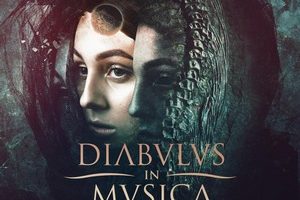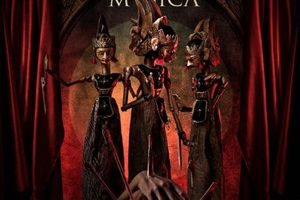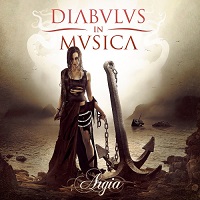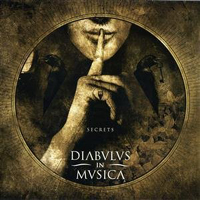Diabulus in Musica – A Musical Family
Tuesday, 11th February 2020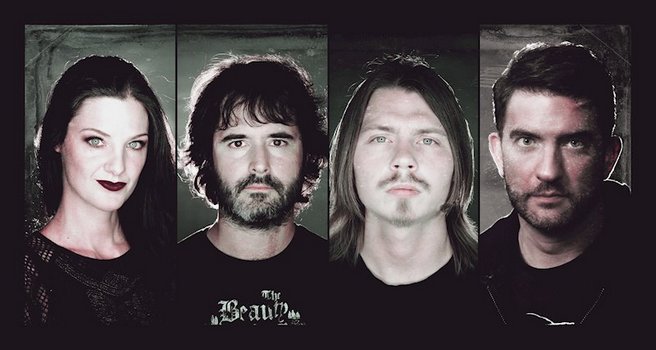
Spanish metallers Diabulus in Musica made their first international marks with Secrets a decade ago. Since then, they’ve steadily built up a name for themselves within the symphonic/power metal scene. Their fifth album, Euphonic Entropy, is set to come out on Napalm Records this week (PRE-ORDER HERE) is their strongest to date – offering a merger of classical and heavy metal elements, in addition to more electronic elements, tastes of swing, and more experimentation. We took a few minutes to chat with the husband and wife team of Zuberoa Aznáres and Gorka Elso to catch us up to speed and discuss the impact of children on the writing process (and band itself), making cover songs in Basque, and what to expect in their future.
Dead Rhetoric: What do you feel that Euphonic Entropy offers fans of your previous releases?
Zuberoa Aznáres: I think that we have included some new elements – we always try to do new things. In every one of our albums you will find different things that we haven’t done before because we are quite eclectic. As musicians, we like to listen to a lot of different music. This is something we also try to do when we are writing. So listeners will find new things, such as a waltz, swing, folk music, electronic music – there’s a little bit of everything and different atmospheres. It’s also one of our heaviest albums as well.
Dead Rhetoric: Do you have any tracks that are significant or special to you in a way?
Aznáres: The fact that we are parents and we had a newborn baby girl as we were about to start writing, it was a bit stressful. With the first [child] it was easier because there was just one, and when they were sleeping we could try to work. But now, when one was sleeping the other one was crying – our other child is now three years old. So it was really difficult to sit down and start writing music. So it’s a very special album because it’s so personal. It’s probably our most personal album since Argia, which was also very special to us. This one is the most special because it talks about both of us as a couple, our new situation as a family, and as musicians as well. So it’s very personal album.
Dead Rhetoric: I have two children myself, and I can’t even imagine how you could find the time to get all of this stuff done. I had stopped writing entirely for a few years when they were that age, so my hat’s off to you two.
Aznáres: I look back and I can’t understand how we did it. I don’t remember the writing process because it was so crazy that I don’t remember. We were working 10 minutes one day, an hour another day – it was crazy.
Gorka Elso: One day it was 1PM and 2AM the next morning!
Aznáres: But for me, this is the best album so far. It’s really weird that when you cannot do it, and don’t have the time, you do great things! I don’t understand why, but maybe it was more focused on what we were doing.
Dead Rhetoric: What did you like about doing the recent Moonspell and Alter Bridge cover tracks?
Aznáres: It was a challenge! The label told us that it would be a good idea to help promote the language, and the first single was written in Basque – it’s a very unknown and ancient language. So the label proposed to us that we could take a few songs from other Napalm Records bands and translate them into Basque. We thought it was a cool idea. I actually didn’t know other Napalm Records bands because I’m not into much new music now since I don’t have the time [laughs]. I had to do some research to find some bands we could do this with. I didn’t want to do a cover from another symphonic metal band either. It would be boring for me. I would prefer to do something different than what we are doing with Diabulus.
I actually didn’t know Alter Bridge’s music before. I hadn’t listened to them before and I was really surprised. They are really well known, but I had only heard the name. I really, really liked their stuff so we took a Moonspell and Alter Bridge song to record. Basque language is really difficult. It has very long words and the words are really difficult to match – the grammar is very difficult. In English, you have very short words and it’s easier to fit them into the verses/choruses. So it was a difficult challenge, but we enjoyed it. This way people can listen to how the language sounds.
Elso: We also had to change the instrumentation. They played guitars and we had to adapt it to the piano and acoustic guitars.
Aznáres: It’s something we did really fast, just to show how the language is.
Elso: It’s always fun to play music. We’ve done this for years!
Aznáres: We did it in our home studio, so it was a very familiar scene.
Dead Rhetoric: With the band being around for 10 years, is there anything you would have done differently at the start?
Aznáres: Of course, because we have grown as both people and musicians. We have learned a lot. When we first started, we recorded in a regular studio and just tried to learn. We tried to learn from the producer and about the production. After that, we started to try new things – on our second album we recorded it at home by ourselves. We tried and studied a lot, so I think now we know how to do things better for sure. If we listen to the first album, we would probably change many things. But there’s no sense, as each album is the product of that period in our lives. I think that’s very cool because you have a little bit of your history in every CD. The sound is special to that period.
Elso: Every song has something special for us. Not only because of what it is talking about, but it’s also the how and when we wrote that song. But yeah, we have changed a lot. There are things for the first album that we had in mind but didn’t know how to achieve. But during the years between, we still had ideas about things we wanted to achieve, but now we know how to get to them. All of the ideas have changed, but we have many tools now.
Dead Rhetoric: The symphonic metal scene is a bit crowded, what does it take to stand out?
Aznáres: I don’t think it’s more crowded than others – everything nowadays is more crowded. The possibilities of listening to music are there. Before we didn’t have things like the Internet or Spotify. Now if you are searching for a specific song, you will find it for sure. I also said that we aren’t doing symphonic metal – we do have it because we are playing with orchestral and classical elements in metal, but we always try to do different things. You can find elements of folk metal, death metal, classical music, jazz, and more in our music. The most important difference in our music would be that – you can find anything. We have no limits in creating music. If something can fit, we will use it. We also like a lot of theatrical music. In our previous material, we have included a song that was kind of theatrical. In this album, we have two that are also in that style. So we try to include things that you wouldn’t necessarily expect from a symphonic metal band. We also have electronic elements in this album.
Elso: Usually the symphonic metal sound is associated with the ‘beauty and the beast’ music. Every day, we listen to every kind of music, so I think it’s reflected in our music. Honestly, I feel like we do metal – just metal. But with some other elements. We include orchestra and choir. It’s important, but it’s a part of the elements we work with.
Aznáres: It’s just music, but with a metal band [laughs].
Elso: Exactly, because we also love the sound of the heaviness and the strength of the guitars, but we also love the sound of the symphonic orchestra and choir.
Aznáres: But we don’t feel attached, like we have to do something because symphonic metal bands do it. In our case we do music and we play with both elements because we are classical musicians as well. We’ve studied it and have that background, and metal because we have been metalheads. The rest is just music [laughs].
Dead Rhetoric: What do you particularly enjoy about melding together classical/theatrical parts into heavy metal?
Aznáres: I think that metal is one of the widest genres, because everything fits with metal. You can do whatever you want, which is kind of cool. We can experiment, and that’s very important in our music. Because of our classical background, it’s something very natural to do. We don’t have to think about it. It flows really well. It’s what we are used to doing – classical music and metal. It’s the perfect balance for us. All of the rest is just experimentation, and it turns out well because it fits the style.
Dead Rhetoric: Going further into the personal aspect, what is it like to be in a band as husband and wife?
Aznáres: We are used to that, because we have been together for so many years.
Elso: In music, we started 17 years ago. I played in a local heavy metal band and Zuberoa joined as the singer.
Aznáres: We met each other then, and we started our own band like 3 years later. So we had been together for 3 years before starting Diabulus. It was easy [laughs].
Elso: Easy and hard [laughs].
Aznáres: We play in a symphonic metal band but we are both really different. We both like metal, but I like one style and he likes a different one. It’s the same with classical music too. In the beginning it was hard, because he wanted to do things a certain way and I didn’t accept it [laughs]. But now, through the years, we have seen that we can make really cool music. It’s the mixed taste of both of us, which creates something new and different.
Elso: The positive and the negative – it’s opposite but we feel the attraction. It’s really important for the music. Sometimes, she gives a certain taste to the music, and on the opposite side, I can give it a different taste.
Aznáres: Also, I’m more the chaotic/artistic part of the team, and he’s the engineer. He puts the order in my disorder. It’s very important. He plays the role of the producer and I play the role of the artist. It’s very cool that we can do things together as the two of us. We don’t need anyone else as we are the perfect team.
Dead Rhetoric: How has having children changed your mindset with the band itself, or has it?
Aznáres: Somehow yes, because you have to think about what your goals are. You can’t go for a long tour with children. You don’t have all the time you want to create music. You have to think and plan about what you are doing, even if it seems impossible sometimes [laughs]. You have to try at least. The most important thing for us now are our children as they are so small. But music also plays an important role in our lives. We cannot live without music, so it’s also important. We need to find that balance: being good parents and making music. Everything changes – priorities, as well as our brains and hormones. It’s like a bomb of feelings. It’s also an important source of inspiration for writing music. You get new feelings that you want to share.
Dead Rhetoric: What do you want to see from heavy metal in the new decade?
Aznáres: Who knows, but I’d love to continue making music for as long as I can. I’d like to grow and play more, and write more albums [laughs]. We never really think about the future. We try to do our best in the present and everything that comes later is a gift. If you have many expectations, you may not achieve them and you will feel disappointed. If you don’t have expectations, then everything is good.
Elso: Our very first goal, 10 years ago, was to record a good album. When we released our first album, Secrets, we felt we had achieved it. When we listened to it a few years later, we thought it was a good album but we could do it better…
Aznáres: But it was the best thing we could do then.
Elso: So all of the rest of the albums are like gifts. The tours, the people that we have met. We never would have imagined it 10 years ago.
Aznáres: We were just a local band, and wanted to record an album in comparison to them. But we also felt that our first shows after Secrets were in Mexico and Holland – we would have never thought of that. It was amazing. Now we have written five albums. So what can we expect?
Elso: We can expect many things, but we are now focused on this album to promote it as good as we can. We’ll see!
Dead Rhetoric: How many Slayer fans have checked out the band based on the name similarity to their album?
Aznáres: [Laughs] Actually we didn’t know about that [album]. We knew Slayer but we didn’t know they had an album called that. Sometimes, there are some trolls out there…
Elso: They say we are copying Slayer.
Aznáres: There’s also another famous Latin American band who have a song called “Diabolus in Musica,” so a number of Latin American bands came to us saying that we had stolen their song. It was like, “Oh my God!” We just chose that term as it is from early music and I sing in several early music ensembles. We really like the duality – ‘diabulus’ would be evil, and ‘musica’ would be the musical part. Our music styles – the dark side and the light, we felt it was the perfect name for us as it fit my musical tastes of early music and the duality of it. But we didn’t know about those other bands.
Dead Rhetoric: What’s next for Diabulus in Musica?
Elso: For the next year we will go on tour. We didn’t finish all the dates yet, but we would like to go out twice this year.
Aznáres: The dates aren’t confirmed, but we are looking to go on tour in May, and the fall as well. We will also play a special show in our city with orchestra/choir around the end of the year. For the moment, we are playing and promoting the album as much as we can. I don’t think we will start writing more music this year [laughs].
Diabulus in Musica official website











